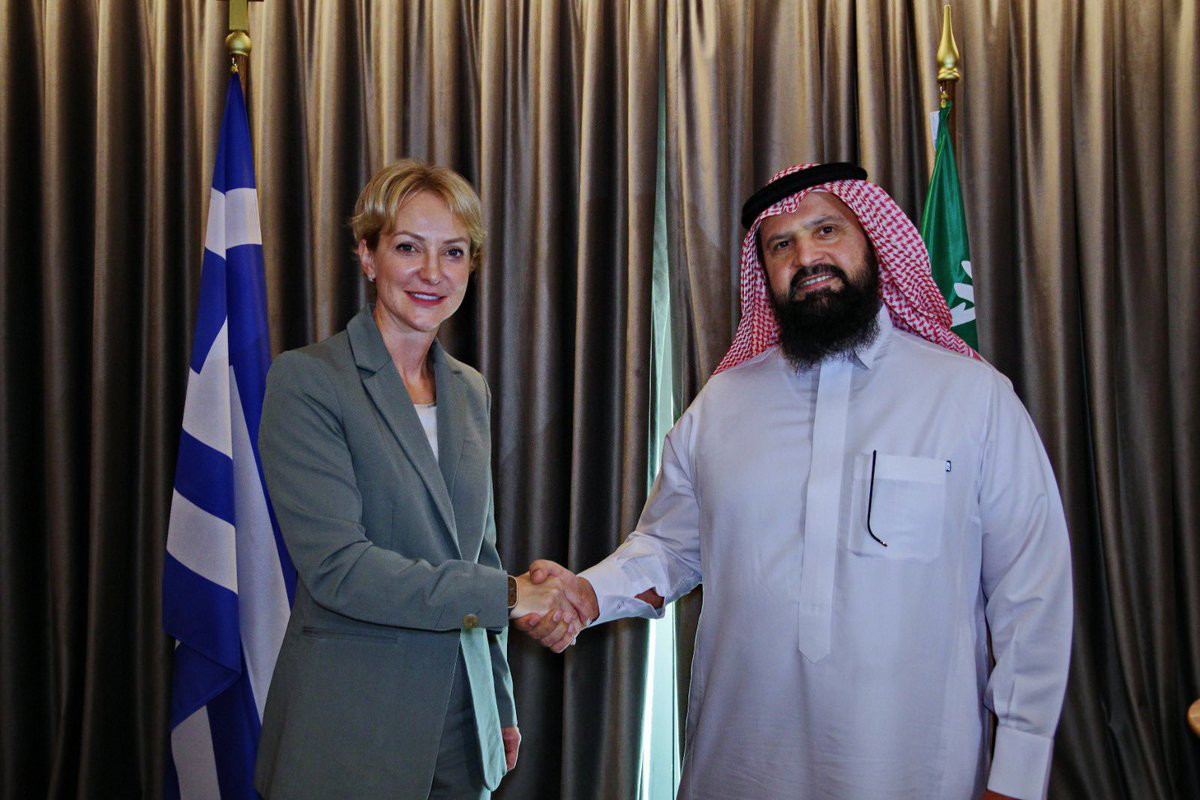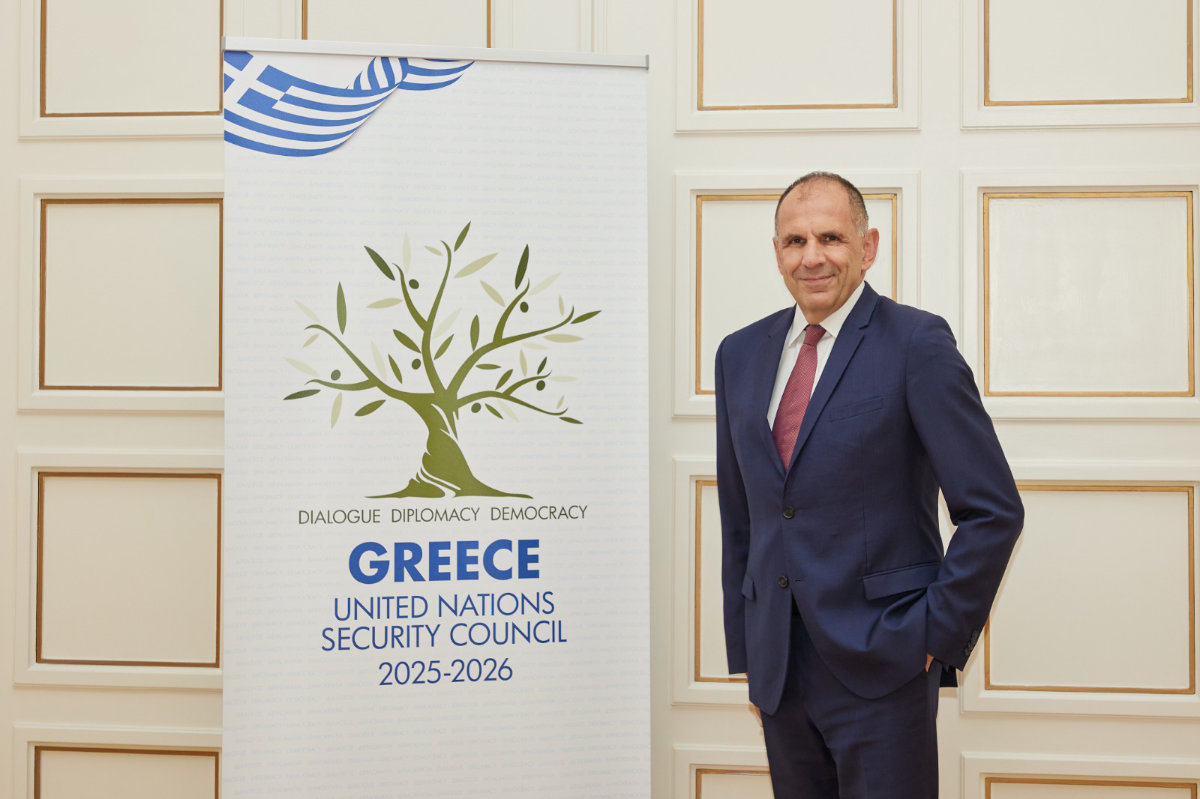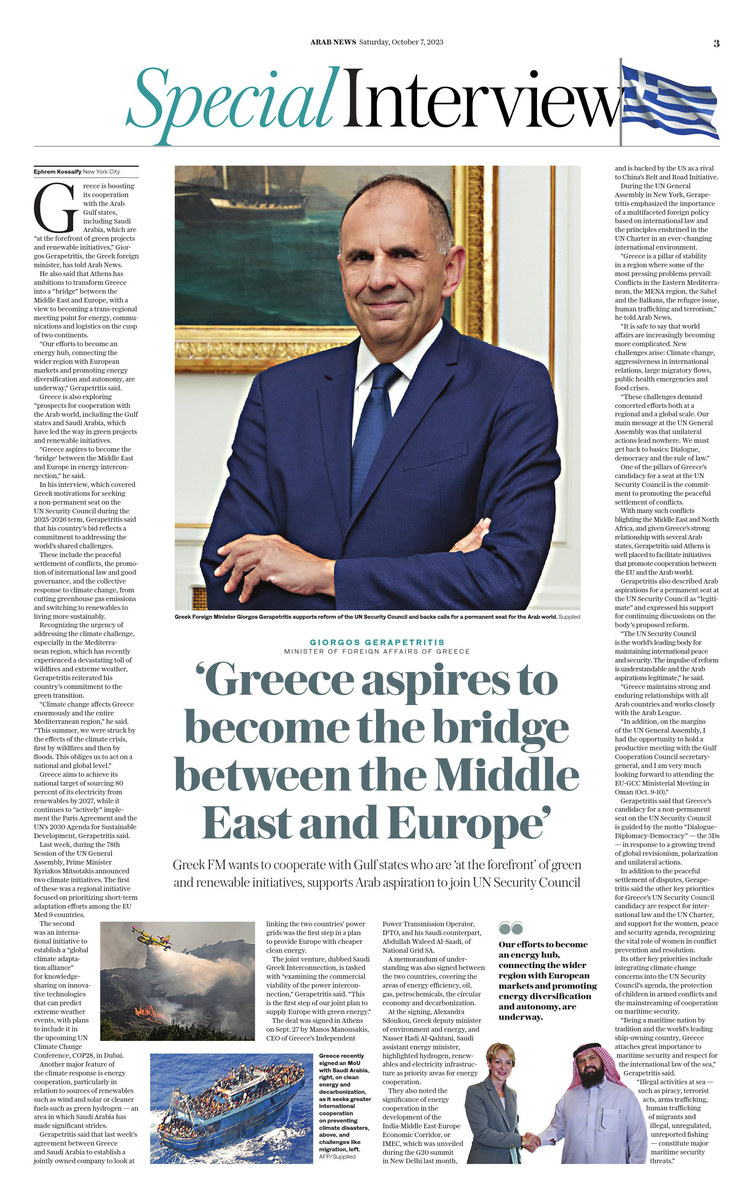NEW YORK CITY: Greece is boosting its cooperation with the Arab Gulf states, including Saudi Arabia, which are “at the forefront of green projects and renewable initiatives,” Giorgos Gerapetritis, the Greek foreign minister, has told Arab News.
He also said that Athens has ambitions to transform Greece into a “bridge” between the Middle East and Europe, with a view to becoming a trans-regional meeting point for energy, communications and logistics on the cusp of two continents.
“Our efforts to become an energy hub, connecting the wider region with European markets and promoting energy diversification and autonomy, are underway,” Gerapetritis said.
Greece is also exploring “prospects for cooperation with the Arab world, including the Gulf states and Saudi Arabia, which have led the way in green projects and renewable initiatives.
“Greece aspires to become the ‘bridge’ between the Middle East and Europe in energy interconnection,” he said.
In his wide-ranging interview, which covered Greek motivations for seeking a non-permanent seat on the UN Security Council during the 2025-2026 term, Gerapetritis said that his country’s bid reflects a commitment to addressing the world’s shared challenges.

Calls for reform of the UN Security Council centered on opening more countries or groupings as permanent members. (AFP/File photo)
These include the peaceful settlement of conflicts, the promotion of international law and good governance, and the collective response to climate change, from cutting greenhouse gas emissions and switching to renewables to living more sustainably.
Recognizing the urgency of addressing the climate challenge, especially in the Mediterranean region, which has recently experienced a devastating toll of wildfires and extreme weather, Gerapetritis reiterated his country’s commitment to the green transition.
“Climate change affects Greece enormously and the entire Mediterranean region,” he said. “This summer, we were struck by the effects of the climate crisis, first by wildfires and then by floods. This obliges us to act on a national and global level.”
Greece aims to achieve its national target of sourcing 80 percent of its electricity from renewables by 2027, while it continues to “actively” implement the Paris Agreement and the UN’s 2030 Agenda for Sustainable Development, Gerapetritis said.
Last week, during the 78th Session of the UN General Assembly, Prime Minister Kyriakos Mitsotakis announced two climate initiatives. The first of these was a regional initiative focused on prioritizing short-term adaptation efforts among the EU Med 9 countries.
The second was an international initiative to establish a “global climate adaptation alliance” for knowledge-sharing on innovative technologies that can predict extreme weather events, with plans to include it in the upcoming UN Climate Change Conference, COP28, in Dubai.

A fire fighting aircraft drops water over a wildfire close to village of Vati in the southern part of the Greek island of Rhodes on July 25, 2023. (AFP)
Another major feature of the climate response is energy cooperation, particularly in relation to sources of renewables such as wind and solar or cleaner fuels such as green hydrogen — an area in which Saudi Arabia has made significant strides.
Gerapetritis said that last week’s agreement between Greece and Saudi Arabia to establish a jointly owned company to look at linking the two countries’ power grids was the first step in a plan to provide Europe with cheaper clean energy.
The joint venture, dubbed Saudi Greek Interconnection, is tasked with “examining the commercial viability of the power interconnection,” Gerapetritis said. “This is the first step of our joint plan to supply Europe with green energy.”
The deal was signed in Athens on Sept. 27 by Manos Manousakis, CEO of Greece’s Independent Power Transmission Operator, IPTO, and his Saudi counterpart, Abdullah Waleed Al-Saadi, of National Grid SA.
A memorandum of understanding was also signed between the two countries, covering the areas of energy efficiency, oil, gas, petrochemicals, the circular economy and decarbonization.
At the signing, Alexandra Sdoukou, Greek deputy minister of environment and energy, and Nasser Hadi Al-Qahtani, Saudi assistant energy minister, highlighted hydrogen, renewables and electricity infrastructure as priority areas for energy cooperation.

Alexandra Sdoukou, Greek deputy minister of environment and energy, and Nasser Hadi Al-Qahtani, Saudi assistant energy minister. (X: @ASdoukou)
They also noted the significance of energy cooperation in the development of the India-Middle East-Europe Economic Corridor, or IMEC, which was unveiled during the G20 summit in New Delhi last month, and is backed by the US as a rival to China’s Belt and Road Initiative.
At the UN General Assembly in New York, Gerapetritis said he highlighted the importance of a multifaceted foreign policy based on international law and the principles enshrined in the UN Charter in an ever-changing international environment.
“I conveyed to all my interlocutors that we are determined to work closely with our EU partners, neighbors, allies and friends to create conditions for the prosperity and security of our nations, our region and the world,” he told Arab News.
“Greece is a pillar of stability in a region where some of the most pressing problems prevail: Conflicts in the Eastern Mediterranean, the MENA region, the Sahel and the Balkans, the refugee issue, human trafficking and terrorism.
“It is safe to say that world affairs are increasingly becoming more complicated. New challenges arise: Climate change, aggressiveness in international relations, large migratory flows, public health emergencies and food crises.
“These challenges demand concerted efforts both at a regional and a global scale. Our main message at the UN General Assembly was that unilateral actions lead nowhere. We must get back to basics: Dialogue, democracy and the rule of law.

This picture taken from a rescue helicopter of the Greek coast guard shows migrants onboard a fishing vessel in the waters off the Peloponnese coast June 13, 2023. (AFP file photo)
“Forging a more deliberative, representative and participatory global governance, regulating global challenges, building on global solidarity and considering the needs of future generations should become the keywords in today’s international policymaking.”
One of the pillars of Greece’s candidacy for a seat at the UN Security Council is the commitment to promoting the peaceful settlement of conflicts.
With many such conflicts blighting the Middle East and North Africa, and given Greece’s strong relationship with several Arab states, Gerapetritis said Athens is well placed to facilitate initiatives that promote cooperation between the EU and the Arab world.
He raised the example of last April’s “Retreat on Syria” in Athens, attended by Geir Pedersen, the UN secretary-general’s special envoy for Syria, and organized with the assistance of the Greek Ministry of Foreign Affairs.
Gerapetritis also described Arab aspirations for a permanent seat at the UN Security Council as “legitimate” and expressed his support for continuing discussions on the body’s proposed reform.
“The UN Security Council is the world’s leading body for maintaining international peace and security. The impulse of reform is understandable and the Arab aspirations legitimate,” he said.
“Greece maintains strong and enduring relationships with all Arab countries and works closely with the Arab League.
“In addition, on the margins of the UN General Assembly, I had the opportunity to hold a productive meeting with the Gulf Cooperation Council secretary general, and I am very much looking forward to attending the EU-GCC Ministerial Meeting in Oman (Oct. 9-10).”
Gerapetritis said that Greece’s candidacy for a non-permanent seat on the UN Security Council is guided by the motto “Dialogue-Diplomacy-Democracy” — the 3Ds — in response to a growing trend of global revisionism, polarization and unilateral actions.

Greek Foreign Minister Giorgos Gerapetritis supports reform of the UN Security Council and backs calls for a permanent seat for the Arab world. (Supplied)
In addition to the peaceful settlement of disputes, Gerapetritis said the other key priorities for Greece’s UN Security Council candidacy are respect for international law and the UN Charter, and support for the women, peace and security agenda, recognizing the vital role of women in conflict prevention and resolution.
Its other key priorities include integrating climate change concerns into the UN Security Council’s agenda, the protection of children in armed conflicts and the mainstreaming of cooperation on maritime security.
“Being a maritime nation by tradition and the world’s leading ship-owning country, Greece attaches great importance to maritime security and respect for the international law of the sea,” Gerapetritis said.
“Illegal activities at sea — such as piracy, terrorist acts, arms trafficking, human trafficking of migrants and illegal, unregulated, unreported fishing — constitute major maritime security threats.”
Greece will further promote the implementation of the UN Convention on the Law of the Sea as the sole legal and institutional framework governing the world’s oceans and seas.
Gerapetritis said: “In 2024, we will host the 9th Our Ocean Conference in Athens on all the significant issues concerning oceans and seas, including ocean health and security, climate change, biodiversity loss, overfishing and marine pollution.”















